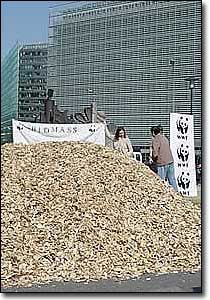
Image: WWF
 |
WWF supporters
demonstrating for greater use of biomass Image: WWF |
"Decision-makers have overlooked the potential of biomass to deliver
sustainable energy for the future."
- Giulio Volpi, WWF Climate Change Programme
| Gland, Switzerland
- June 17, 2004 [SolarAccess.com] Carbon dioxide emissions could be
significantly cut if OECD (Organisation for Economic Co-operation and
Development) countries used biomass -- fuel generated from agriculture
and forest products -- instead of coal to generate electricity,
according to a report by WWF and the European Biomass Association (AEBIOM). The report indicates that the use of biomass could reduce emissions of carbon dioxide (CO2), the main global warming gas, by about 1,000 million tones each year -- a figure equivalent to the combined annual emissions of Canada and Italy. According to the report, biomass provides a cost-effective and carbon-neutral source of energy that could provide 15% (from the current 1%) of the electricity demand from industrialized countries by 2020. It could supply power to 100 million homes, equivalent to replacing about 400 traditional large power stations. The report further shows that the substantial increase of biomass for clean power production would require less than 2% of land from industrialized nations and will not compete with food production and nature conservation. The report says that the production of biomass will create up to 400,000 jobs by 2020, particularly in rural areas. In the Northeast, Southeast and West Coast regions of the US alone, the biomass industry has already provided about 70,000 jobs. The report further shows that biomass will be instrumental in meeting national renewable electricity targets under the Kyoto Protocol. In addition, Sweden is switching to biomass as part of the government's commitment to phase out nuclear power. "Decision-makers have overlooked the potential of biomass to deliver sustainable energy for the future," says Giulio Volpi of WWF's Climate Change Programme. "The big advantage that biomass offers over other renewable energy sources such as wind and solar is that it can be stored and used when needed. It can provide a constant, non-fluctuating supply of electricity." The report recommends that governments develop and implement policies to increase the potential for renewable energy sources such as biomass in the power sector. It calls on industrialized countries to reform their agricultural policies to support the production of energy crops for biomass. The report further recommends that governments develop and enforce best practice guidelines for biomass production to minimize any negative social, economic, or environmental impacts. As ministers met at the International Conference on Renewable Energies in Bonn, Germany from 1-4 June, WWF and AEBIOM called for firm commitments towards increasing the share of renewable energy such as biomass at national and international levels. The WWF said the EU, specifically, must show global leadership by setting a target to supply 25% of its primary energy demand from renewable energy sources by 2020. "No doubt, the report sets an ambitious target for biomass use over the next 15 years, but there is a huge untapped biomass resource across Europe with potential for delivering sustainable energy on a wide scale," says Jean Marc Jossart, Secretary General of AEBIOM. "If governments and the power sector do not act now to encourage biomass as a long-term, stable, and secure option for renewable energy, they will lose out on a big opportunity to fight climate change and increase energy security." |
|
|
| For
Further Information: • WWF Report (.pdf) |
Please Note: SolarAccess.com and Arizonaenergy.org do not endorse the sites behind these links. We offer them for your additional research. Following these links will open a new browser window.
Copyright © 1999 - 2004 - SolarAccess.com
Please visit www.solaraccess.com for great coverage on energy today!!